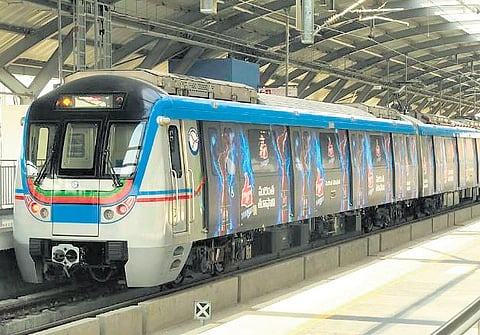

HYDERABAD: With increasing demand from several quarters, Part A of Phase-II of Hyderabad Metro expansion will see the establishment of five corridors spanning 76.4 km across 54 stations at a cost of Rs 24,269 crore, said NVS Reddy, managing director, HAML & HMR, on Monday.
While three corridors from Phase-1 are operational, the new corridors include Shamshabad-RGIA Airport corridor, Raidurg-Kokapet Neopolis, MGBS-Chandrayangutta (Old City), Miyapur-Patancheru and LB-Nagar. Part B will see expansion from RGIA to the proposed Fourth City (Skill University), forming the sixth corridor.
“These corridors are mainly extensions of existing corridors, with work being done on both sides, and a separate Airport Metro corridor will connect all three existing corridor,” Reddy told TNIE.
The project is a joint venture of the Union and Telangana governments, with the state contributing Rs 7,313 crore (30% of the cost) and the Union government contributing Rs 4,230 crore (18%). Loans from Multi Development Banks (MDBs), including JICA, ADB, NDB, is Rs 11,693 crore (48%) with the remaining Rs 1,033 crore (4%) from a public-private partnership.
“The advantage of this system is that at only around 2% interest rate compared to 9-10% rates of the Indian banks. The repayment period is also longer, up to 5-10 years of moratorium and 30 years for repayment. So, we have the advantage of over 40 years to repay this amount,” Reddy added.
The project’s detailed project report (DPR), comprehensive mobility plan (CMP), and alternatives analysis are under evaluation by the Ministry of Housing and Urban Affairs.
Demolition works for Old City Metro from Dec-end
Reddy also announced that demolitions for the Old City Metro will begin in the fourth week of December, with preliminary work starting in January 2025. No major Right of Way (RoW) or land acquisition issues are expected. Of the 1,100 affected properties, around 800 sketches have been sent to Hyderabad Collector, 500 preliminary notifications (PN) and 200 preliminary declaration (PD) have been issued.
“In the 7.5 km stretch from MGBS to Chandrayangutta, there are 106 religious and heritage sites, but we have engineered solutions to avoid demolishing any of them. The route is 500 m away from national monuments Charminar and Salar Jung Museum,” Reddy explained, adding that the construction is going through U-girders.
Current ridership is 5 lakh per day, with an additional 8 lakh expected after Phase-II completion.
Per km cost less than other metro cities
According to the officials, the per-kilometer construction cost for stations in Phase-II is Rs 318 crore, which is lower than other metro cities like Bengaluru (Rs 373-569 crore), Chennai (Rs 619-756 crore), and Mumbai (Rs 543-1,492 crore). “This is due to elevated metro design and construction innovations,” Reddy explained.
Without the expansion, Hyderabad metro would drop from its current third position in India to ninth. However, with Phase-II, it will regain its third position, officials said.